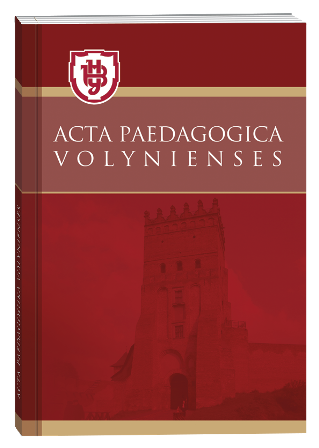OPTIMAL CONDITIONS FOR LEARNING A FOREIGN LANGUAGE IN PRIMARY SCHOOL
DOI:
https://doi.org/10.32782/apv/2022.1.2.31Keywords:
primary school, foreign language, linguistic and literary branch, New Ukrainian schoolAbstract
This article considers the creation of optimal conditions for learning a foreign language in primary school. The teaching of students of the New Ukrainian school, according to the new state standard, considering age characteristics. Considers textbooks for primary schools, introduction of lexical units and separate vocabulary. Introduction of lexical units and separate vocabulary, patterns in the language system gradually appear when the child is conceptually ready to accept them. Consistency is also achieved when activities provide a basis for doing what children can understand and perceive as appropriate, and when the relationship between the outcomes and their own learning becomes clear and explained. In order to create optimal conditions for learning, we need to resort to activities that develop creativity, imagination and imagination, which are part of the world of young children, which can help with effective learning. One of the types of such work is project work – the article describes this form of lesson. The modern teacher should provoke the interest to study. The importance of establishing contexts and connecting with other areas of children's learning and experience is emphasize. Describes the phased teaching of the material. The main purpose of positive child management is to create and maintain a happy work environment, in which the norms and rules of behavior in the classroom are respected. Children are engaged in purposeful activities and feel safe and motivated to learn. Maintaining a balance between children's satisfaction and acceptable behavior is often one of the biggest challenges facing foreign language teachers. As children grow older, classroom management as a whole can be as integral. A variety of activities, the development of interest in learning, the proper organization of the lesson – as a guarantee of achieving the goals of the new program.
References
Іноземні мови. 1–4 класи : типові освітні програми, методичні рекомендації щодо організації навчально-виховного процесу в 2018/2019 навчальному році / Укладач М. Н. Шопулко. Харків : Вид-во «Ранок», 2018.
Казанжи О.В. Методика навчання іноземної мови : навч-метод. посіб. Миколаїв : МНУ ім. В.О. Сухомлинського, 2019. 227 с.
Редько В. Г. Лінгводидактичні засади навчання іноземної мови учнів початкової школи : монографія. Київ: Ґенеза, 2006. 136 с.
Growth patterns in the developing brain detected by using continuum mechanical tensor maps / P. M. Thompson et al. Nature. 2000. Vol. 404, no. 6774. P. 190–193. URL: https://doi.org/10.1038/35004593 (date of access: 29.12.2021).
Kiely R., Rea-Dickins P. Evaluating foreign language teaching in primary schools. Program evaluation in language education. London, 2005. P. 136–149. URL: https://doi.org/10.1057/9780230511224_10 (date of access: 29.12.2021).







